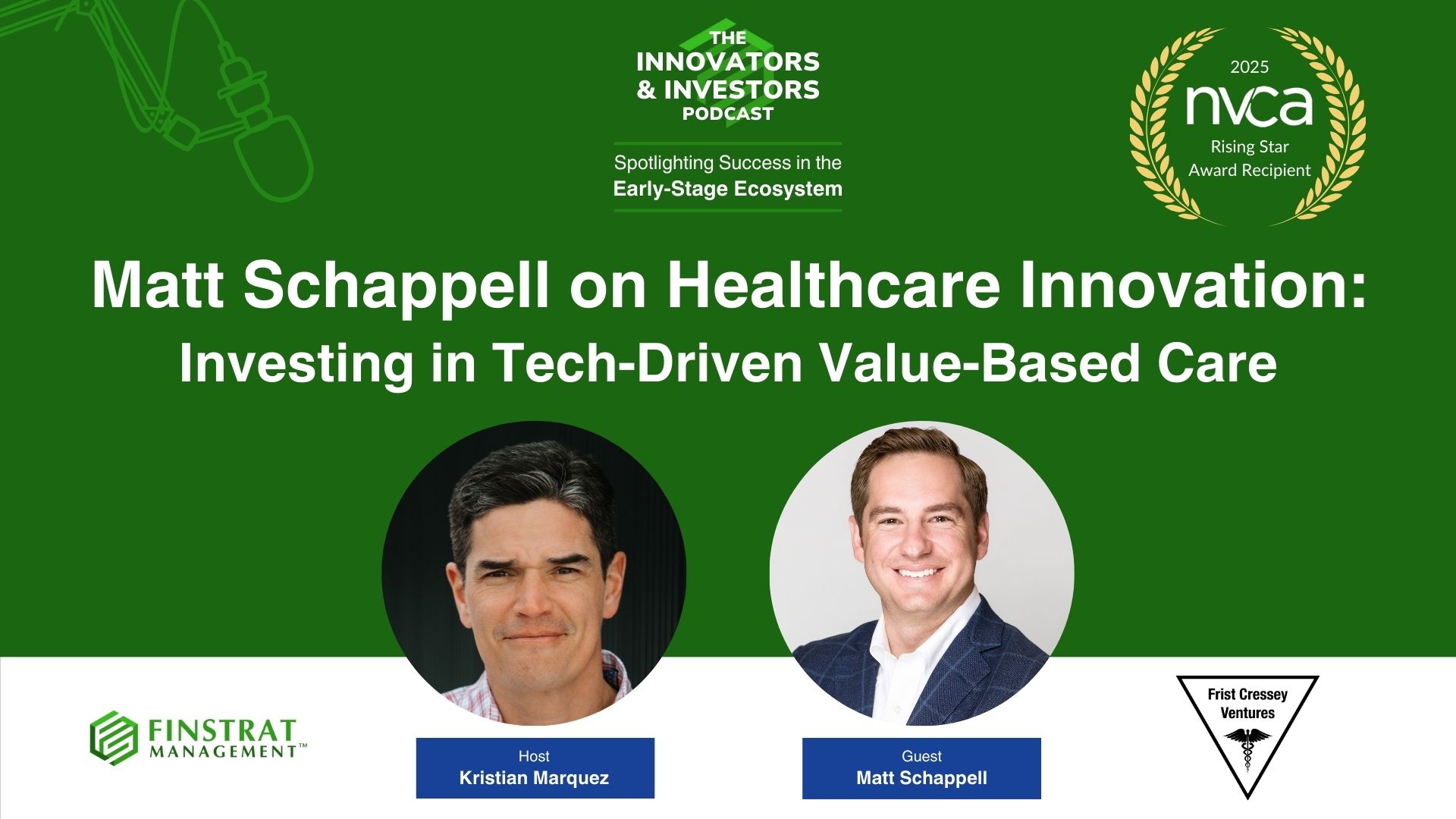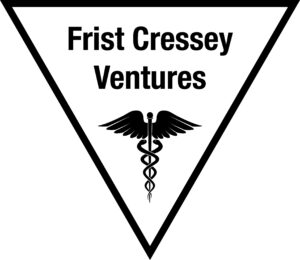Matt Schappell on Healthcare Innovation: Investing in Tech-Driven Value-Based Care
September 5, 2025 | 41 MIN

This is the fourth of four episodes in a special series dedicated to the 2025 NVCA Award Recipients. To learn more about the NVCA and their work in crafting the future of Venture Capital, visit their website at https://nvca.org/.
Highlights
- Frist Cressey Ventures focuses on early-stage healthcare companies transforming the industry through technology and innovation.
- Healthcare is a complex, human-centered, and hospitality-driven industry facing rising costs, workforce shortages, and slow tech adoption.
- Long sales cycles (12-18 months) in healthcare require startups to be well-capitalized and benefit from investor networks to accelerate adoption.
- AI is rapidly evolving in healthcare, with strong potential to enhance diagnostics, primary care, and automation while retaining human oversight.
- Value-based care is a key investment area, shifting incentives from fee-for-service to patient health outcomes.
- Interoperability remains a critical challenge, with ongoing policy efforts to enable seamless health data exchange across systems.
- Matt’s career journey highlights the importance of deep industry experience, leadership, and mentorship in healthcare investing.
Summary
In this episode of the Innovators and Investors Podcast, Kristian Marquez interviews Matt Chappell, an investor at Frist Cressey Ventures (FCV), a healthcare-focused venture capital firm. Matt shares insights into FCV’s origins, investment thesis, and healthcare innovation landscape shaped by his unique background in healthcare administration and investment banking. Founded about nine years ago by Senator Bill Frist and Brian Cressey, FCV targets early-stage healthcare companies, particularly those leveraging technology to address systemic challenges, excluding FDA-regulated sectors like medtech and biotech. Matt emphasizes the firm’s mission-driven approach prioritizing patient impact alongside financial returns. He discusses the structural complexities of healthcare, including slow technology adoption, high costs, workforce shortages, and interoperability challenges, underscoring the critical role of innovation to transform the industry. Matt highlights the firm’s value-add in helping startups navigate lengthy healthcare sales cycles by leveraging their LP base of payers and providers. The conversation also covers AI’s transformative potential in healthcare, especially in diagnostics and primary care, while maintaining the “human in the loop” aspect due to healthcare’s hospitality nature. Matt reflects on his career path from healthcare business development to investment banking and ultimately venture investing, emphasizing the importance of understanding healthcare’s human-centric operations and leadership. FCV’s portfolio spans value-based care, healthcare technology (including AI-driven automation), and patient experience enhancement companies. Matt advocates for patient empowerment through education and simplified healthcare navigation, akin to consumer industries like travel and hospitality. Finally, he shares personal reflections on mentorship and work-life balance, honoring a late mentor who modeled success across professional and personal domains. Matt encourages entrepreneurs to connect with him for collaboration and capital raising.
Key Insights
- Founding Story Shapes Investment DNA: FCV was founded by a former Senate Majority Leader and a seasoned healthcare private equity investor, blending policy insight and financial expertise. This origin informs a mission-driven approach that balances patient impact with financial returns, focusing on early-stage ventures with transformative potential rather than FDA-regulated sectors. This unique positioning allows FCV to act nimbly within complex healthcare dynamics.
- Healthcare’s Structural Challenges Demand Innovation: Healthcare consumes nearly 20% of the U.S. GDP, yet suffers from rising costs, quality variability, workforce constraints, and fragmented systems. These entrenched issues create a “breaking point” scenario where innovation—especially technology adoption and new payment models—is essential to prevent worsening outcomes and financial unsustainability. Investors must understand the macroeconomic and operational pressures shaping the market.
- Navigating Lengthy Sales Cycles Requires Strategic Capital and Network: Unlike many tech sectors, healthcare startups face protracted sales cycles (12-18 months) due to complex stakeholder approval processes and risk aversion. This necessitates significant capital reserves and patient growth strategies. FCV’s LP base includes payers and providers, providing portfolio companies valuable ecosystem access to shorten sales timelines and validate business models, which is a crucial competitive advantage.
- AI as a Catalyst but Not a Replacement for Human Care: AI’s rapid evolution offers powerful tools for data analysis, diagnostics, and workflow automation. However, healthcare’s inherently human and hospitality-focused nature means fully automated care (e.g., robot doctors) is unlikely soon. Instead, AI will augment providers, improve triaging, and enhance patient experience, creating hybrid care models that combine technology with empathy and human judgment. Continuous monitoring of AI trends is vital for investors to identify promising innovations.
- Value-Based Care Realigns Incentives Around Patient Outcomes: Transitioning from fee-for-service to value-based care models shifts healthcare payment structures to reward keeping patients healthy rather than volume of services. FCV invests in companies addressing chronic disease management, palliative care, and specialty-specific value-based solutions, which can reduce costs and improve quality. This shift represents a fundamental transformation in healthcare economics and creates fertile ground for innovative startups.
- Interoperability Is a Policy and Market Imperative: The lack of interoperability—where electronic health records (EHRs) and data systems fail to communicate—fragments care and hinders innovation. Policy efforts, including recent executive orders, aim to break down data silos and enable seamless information flow, which is critical for AI applications, care coordination, and consumer empowerment. However, balancing data sharing with privacy and competitive concerns remains complex, requiring nuanced, ongoing engagement from investors and founders.
- Deep Industry Experience and Leadership Matter: Matt’s background—from a healthcare family to hospital business development, investment banking, and venture capital—provides him with a holistic understanding of healthcare’s operational, financial, and cultural complexities. His reflections highlight that leadership at every level—from physicians to executives—plays a pivotal role in driving change. Mentorship and balancing personal and professional life are also critical to sustaining a successful career in this demanding sector.
Additional Context
Matt’s narrative about healthcare being a hospitality business reframes the industry’s challenges through a service and human experience lens, emphasizing the importance of patient satisfaction and education. His analogy comparing healthcare navigation to simplified consumer experiences like airline booking underscores the opportunity to empower patients with clearer choices and transparency. FCV’s diverse portfolio across technology, value-based care, and patient engagement reflects a comprehensive approach to tackling systemic issues from multiple angles. The firm’s commitment to continuous learning—evidenced by biweekly AI-focused meetings—demonstrates adaptive strategy critical in a rapidly evolving sector. Lastly, Matt’s openness to connecting with entrepreneurs signals a collaborative mindset aimed at fostering innovation with aligned partners.
This interview provides a rich, multidimensional view of healthcare venture investing today, blending practical wisdom, strategic insight, and personal reflection to illuminate how early-stage capital can drive meaningful, lasting change in one of the world’s most vital industries.
Stay up-to-date with Matt Schappell and his work with Frist Cressey Ventures.
Follow the show on your podcast channel of choice or listen below.




